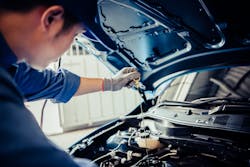Should automotive repair technicians be licensed?
In a recent panel discussion hosted by Motor Age about servicing Teslas, the topic came up about whether or not technicians should be licensed in the United States.
In Europe, automotive technicians need to be licensed to practice their trade. That model does not currently exist in this country; however, some of the panellists said this is something we might see on the horizon, especially with more and more electrification coming to the industry.
“We know electrified platforms are only less than three percent of the marketplace today in the aftermarket, but we're going to see that growing,” president of Diag.net and contributing editor for PTEN, who sat on the panel. “I'm in California and we see a ton of those vehicles here, so there’s safety potential there and so there may be some standards around that.”
The safety element needs to be top of mind when working on EVs, and Pete Meier, director of training at Motor Age, says it’s important for technicians to truly understand how these systems are different from what many of them are used to.
“I try to let our audience know that these are areas that you can’t get almost right, you know? They have to be right,” he said.
But Donny Seyfer, executive director for NASTF, who also spoke on the panel, has worked with government for over 25 years, and he doesn’t see licensing happening any time soon.
“Licensing is a big stretch… We've gone through ‘how do we license technicians’ and what it does is it punishes the ones who are doing the job right,” he said. “And because there's not enough police force in place to police the people who aren't doing it right — who aren't licensed or working out of their backyard — that's really the struggle, and that's always the argument to shoot this in the foot.”
NASTF does currently have the capability in its SDRM to limit the release of information to only certain qualified individuals — like certified techs for instance.
“Automakers want to bring more information to the table for technicians to do diagnostic work, but they want to be able to know that that technician is somebody who's legitimately in business,” Seyfer said. “So that that's really the piece that we've been able to create with NASTF; there's an accountability there.”
Regardless, Brown, Meier, and Seth Thorson, president of Eurotech Automotive who was on the panel as well, agreed that the automotive repair industry should work together to come up with some solutions, rather than wait around for government to put a mandate in place. As Brown noted, it wouldn’t be ideal to have a “a government agency who doesn't know as much about our industry as we do calling all the shots.”
Ultimately, it seems unlikely at this point that government would pursue licensing, so it might rest on the shoulders of the industry to make sure technicians are kept safe when working on these high-tech electric vehicles.
“Government officials have a hard time slapping a license on something like this,” Seyfer. said, “but they have no problem taxing something, so if they can figure out how to make it a tax, they might actually like it.”
About the Author

Amanda Silliker
Amanda Silliker is the former editorial director of the Vehicle Repair Group at Endeavor Business Media. She oversaw five brands — Motor Age, PTEN, Professional Distributor, ABRN, and Aftermarket Business World. Prior to her tenure with Endeavor, she had over a decade in B2B publishing at Thomson Reuters, ranging from writing and editing content for print and web to managing awards programs and speaking at conferences and industry events. Connect with her on LinkedIn.
